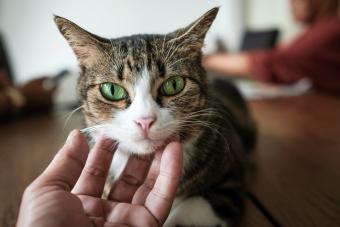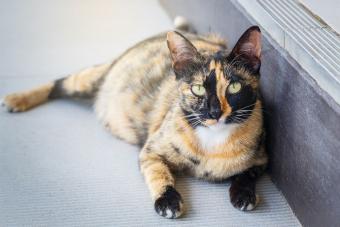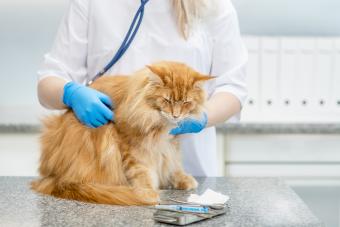
For anxious kitties who don't respond to behavior modification, cat anxiety medication may help. Anxiety happens when your kitty's nervous system is on high alert, even when there's no threat. This can be distressing for your cat and lead to many behavioral problems. Fortunately, there are many feline anxiety medication options to consider. Before you make a decision about medication, it's important to consult with your vet and learn about the effectiveness, side effects, cost, and other factors that could impact your choice.
How Can You Tell if Your Cat Has Anxiety?
If your cat is struggling with anxiety, you may notice certain behaviors. Some cat anxiety symptoms are obvious, and others are easy to miss because they seem like they're related to something else. According to Dr. Greg Miller, DVM, a veterinarian with eight cats of his own, feline anxiety can express itself in two primary ways: "About 75% go into hiding mode, and 25% go into aggressive mode," he says. "It's kind of like with people. Some lash out, and some are less confident."
Cat Anxiety Symptoms
In addition to hiding and feline aggression, you may also notice the following behaviors in an anxious kitty:
- Excessive vocalization
- Changes in appetite
- Urinating or soiling outside the litter box
- Excessive grooming
- Staring
- Dilated pupils
- Hunched body posture
Does Every Anxious Cat Need Anxiety Medication?
Not every anxious cat needs medication. Dr. Miller only recommends using anxiety medication after you've had a behavioural consultation with your veterinarian and tried other approaches. This includes examining the situation to determine what has changed and may be causing stress. "Cats are some of the most contextual animals there are," he says. "It's all about the situation and whether or not the situation feels safe and was safe before. Medication by itself never fixes the problem. It needs to be combined with behavior modification."
Prescription Cat Anxiety Medication Options
Never start anxiety medication without talking to your vet. Your vet may need to do a blood test to confirm your cat is in good health and won't be harmed by the effects of the medication, since some medications can worsen heart disease. If you and your vet determine your cat might benefit from anxiety medication, there are a few choices.
Antidepressant Medications for Cat Anxiety
Some antidepressants can help calm anxious cats. Dr. Miller says these medications don't stop the cat from experiencing his or her world, but they can take the edge off the anxiety the animal feels. "[An antidepressant] would be my first choice because it mellows them out," he says. "It works with aggressive cats and insulates them from the intensity of the situation." There are several anti-depressants your vet might consider, including the following:
- Selective serotonin reuptake inhibitors (SSRIs) - These long-acting medications include fluoxetine, paroxetine, and sertraline, which can be especially effective for generalized anxiety, inappropriate urination, and aggression. Antidepressant anxiety medication side effects are rare but can include appetite changes, lethargy, vomiting, and diarrhea.

- Serotonin antagonist and reuptake inhibitors (SARIs) - These are shorter-acting medications, such as trazodone, which can work well to control generalized anxiety and aggression in cats. Side effects may include lethargy, agitation, vomiting, and diarrhea.

- Tri-cyclic antidepressants - Tri-cyclic antidepressants like amitriptyline and clomipramine are longer-acting medications that help control cat anxiety symptoms like aggression, inappropriate elimination, and compulsive behavior. They have similar side effects to other antidepressants, including lethargy, appetite changes, and stomach upset.

Benzodiazepines for Cat Anxiety
A class of medications called benzodiazepines can also help especially anxious cats, including those with phobias or panic disorders. These medications include alprazolam, oxazepam, and diazepam. These medications are short-acting and take effect within about 30 minutes. It's important to note that benzodiazepines may not be right for cats with aggressive behavior, since they can reduce the cat's impulse control and lead to more aggression. In addition to a loss in impulse control, other possible benzodiazepine side effects include increased appetite, lethargy, loss of coordination, and inappropriate excitement and vocalization.
Gabapentin for Cat Anxiety
Gabapentin is an anticonvulsant that Dr. Miller says works especially well for cats who are aggressive. "It's truly a game-changer for aggressive cats," he says, "but you need to dose frequently. It's not a long-acting solution." As a cat anxiety medication, gabapentin only lasts for 8-12 hours and has a few possible side effects, including lethargy, agitation, loss of coordination, and vomiting. It's also important to note that you should never give your cat a human prescription for gabapentin, as it may contain xylitol (which is poisonous to cats).
Buspirone for Cat Anxiety
If your cat gets picked on by other cats in your household and is getting into cat fights, buspirone is a medication that can help with social confidence. This medication can also help with generalized anxiety. It's a long-acting medication that can take up to eight weeks to work. Side effects can include increased affection, stomach upset, agitation, and lethargy.

Cat Anxiety Medication: An Over-the-Counter Choice
If a prescription anxiety medication isn't the right choice for your cat, you might consider an over-the-counter option. A protein found in milk called alpha-casozepine may be effective in reducing anxiety. It's the active ingredient in the Royal Canin Calm Diet, which Dr. Miller recommends for anxious cats. "It contains a milk protein that is soothing, and it can make them more affectionate," he says. Alpha-casozepine is also the active ingredient in the over-the counter cat anxiety medication Zylkene. It lasts about four hours and has few side effects.

No One-Size-Fits-All Solution
Before you choose a medication for your cat, it's essential that you consider the other factors that may be contributing to his or her anxiety. For instance, many cats are nervous about traveling or the introduction of a new cat in your home. Dr. Miller stresses that the environmental situation matters and the right approach to medication is different for every cat. "There is no one-size-fits-all solution," he says.
All of LoveToKnow's product recommendations are hand selected by our editorial team and follow our editorial policy. For some but not all, if you decide to shop we may collect a small share of sales or other compensation.







